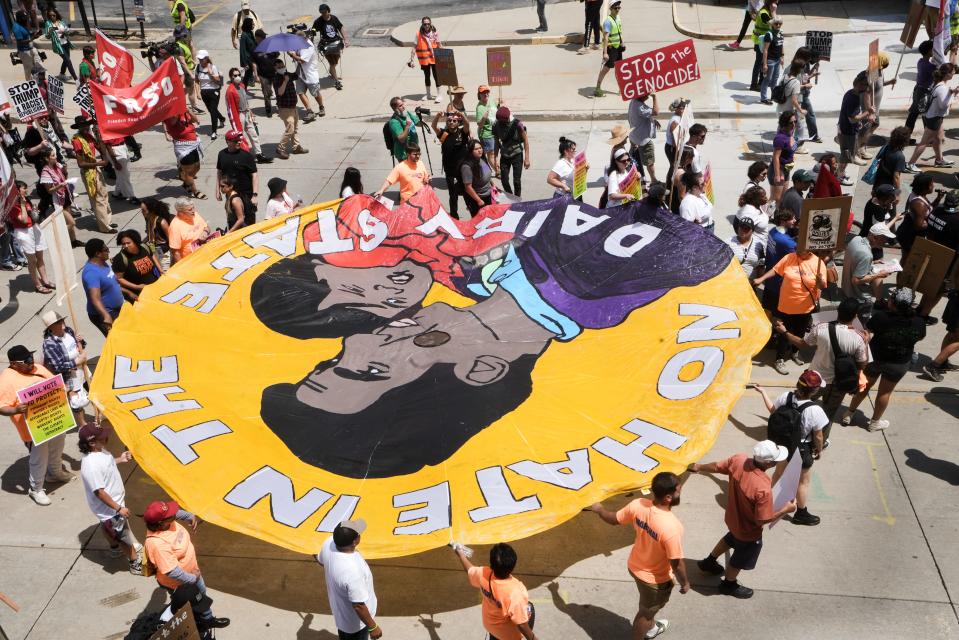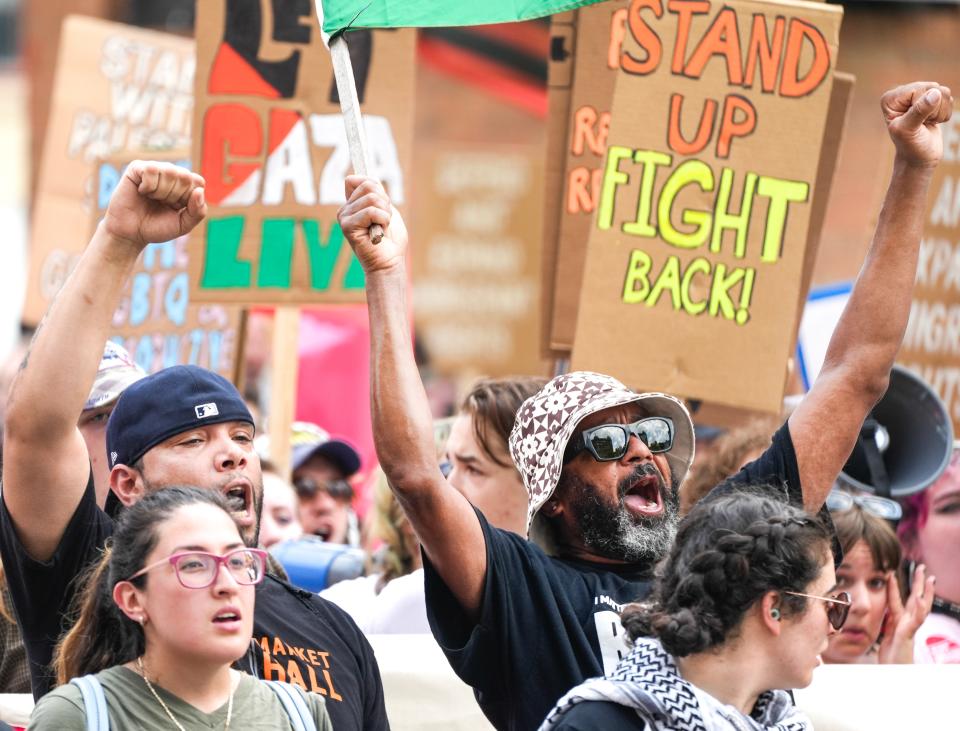Hundreds protest in Milwaukee with Coalition to March on the RNC
They came from across the country to march.
Their causes varied from supporting abortion rights to standing with the Palestinian people and defending the rights of immigrants and LGBTQ people and much more.
On Monday, they were united and marched in opposition to the Republican National Convention and former President Donald J. Trump.
Just days earlier, Trump had survived an attempted assassination at a rally in Pennsylvania, prompting a fresh round of scrutiny on RNC security and fears of a heightened chance of conflict between protest groups.
Instead, the city's two protest zones were quiet into the early afternoon Monday, as sweltering temperatures led people to seek shade and indoor air conditioning.
Opinion: What do you think of Trump’s VP pick in Sen. JD Vance?
The Coalition to March on the RNC 2024 continued on its planned route on two loops downtown, starting at Red Arrow Park. They stayed outside the credentials-only “hard” security zone around the RNC and paused just outside a delegate entry point, when they were a block away from Fiserv Forum to make themselves heard by convention-goers.
That was the most tense point of the march as anti-abortion protesters and the marchers shouted at each other. However, Coalition workers along with officers from a special unit from Columbus, Ohio, Police Department designed to defuse confrontations.
Coalition Co-Chair Omar Flores said on Friday he was expecting over 5,000 people to attend the march. Roughly 500 were present at the start of the march.
He said the group wanted to make it clear to the Republicans that they were "not welcome in Milwaukee."
"Today went extremely well," he said at the end of the march. "We had no confrontations."

Demonstrators speak about different causes at Red Arrow Park
The Coalition consists of local and national organizations including the Milwaukee Alliance Against Racist and Political Repression, Reproductive Justice Action Milwaukee, and the Milwaukee Anti-War Committee.
Many organizers are also unsatisfied with the Democratic party and plan to protest the Democratic National Convention in August in Chicago.
Charlie Berg came from Minneapolis with the Climate Justice Committee. He said the Democratic and Republican parties have both failed to address climate change.
“We need a platform and policy that is actually going to address climate change and we can’t do that so long as we have U.S. militarism, so long as we have reliance on fossil fuels, and so long as those corrupt parties are in power,” Berg said.
Victoria Hinckley, who said she was expelled from the University of South Florida for her involvement in a Palestinian-solidarity encampment there, attended the march with others from Students for a Democratic Society. Hinckley’s remarks Monday focused on abortion.
“These attacks on reproductive freedom and abortion access are harshly felt in the South, especially in states like Florida and Texas with the emergence of anti-abortion bills banning abortion within the first few weeks of pregnancy,” she said.
Bill Nantell and Kathleen Joynt, who live near downtown Milwaukee and are both in their mid-70s, said they came to Red Arrow Park to march against Republican policies on abortion, race and benefits for senior citizens.
"I have voted for both Democrats and Republicans," Nantell said. "This is not a Republican Party I am familiar with at all."
What to know: Who is the band playing at the 2024 RNC in Milwaukee?
Nantell said he would like President Joe Biden to step aside for a younger Democratic candidate but said he will vote for Biden if he stays in the race.
The marchers left Red Arrow Park about noon, heading south on Water Street, across the Milwaukee River on Wells Street, before marching south on Plankinton Avenue. At several points, marchers climbed over concrete embankments set up in the road but that drew no action by police.
The group crossed the river again and marched north on Water Street to West Juneau Avenue, then south on Dr. Martin Luther King Jr. Drive before crossing the river a final time at West State Street.
At the start of the march, a handful of counter-protesters were seen at Red Arrow, deriding LBGTQ people and the Black Lives Matter movement.

March entered into the 'soft' security zone as planned
The Coalition considered it a victory that they were able to get as close to Fiserv as they did, passing unimpeded into the RNC's broader "soft" security zone. It had been unclear whether police might stop the group. Police officers from Milwaukee and several other agencies stood by but there were no confrontations between protesters and law enforcement. Officers along the route Monday were seen being friendly, polite and helpful to marchers.
The soft security zone is governed by the city's extraordinary event ordinance, which established certain areas where protests are allowed, including a "parade" route for marches five blocks south of Fiserv. The Coalition, as planned, took a separate route as they were adamant about being within "sight and sound" of Fiserv.
"There's been some doubts coming into this from folks in Milwaukee, that a march right now is very dangerous, that we shouldn't do it, and we always countered that narrative," Flores said. "We feel like that's a Republican-supporting narrative that it's going to be dangerous. We knew from the start that we know how to host a family-friendly march."
The Coalition had published its planned route in advance and pressured city officials to allow them on the route. Last Friday, Flores announced the Coalition had reached a "handshake agreement" on the route with city officials. Officials didn’t confirm such an agreement Friday but said they were working with the group to ensure marchers could safely exercise their rights.
City Attorney Evan Goyke and former deputy city attorney Adam Stephens, who is working for the city this week as special counsel, were seen at the front of the demonstration observing the march.
Goyke declined to answer questions. He previously told the Journal Sentinel that he and Stephens would be observing protest activity around the RNC throughout the week.
A quiet start inside the designated protest zones
The first two groups scheduled to speak at the Haymarket Square Park protest zone, just north of the Fiserv Forum, were no-shows.
At the south protest zone in Zeidler Union Square, three people at the square's pavilion briefly read testimonies from both local and national victims of gun violence, attracting one spectator, late Monday morning.
Ashanti Hamilton, director of the city's Office of Community Wellness and Safety, was at the north zone to coordinate the speaker's platform and event security staff in orange shirts.
Most of the staff were community organizers trained in de-escalation and mediation tactics, Hamilton said.
"These are the most experienced folks that we have in crowd control," he said.
He said the recent assassination attempt on Trump changed the potential protest landscape.
"I'm just hoping now that we have heightened tensions, that those things don't boil over into any of the demonstration activities," he said.
Quinn Clark, Sophie Carson, Cary Spivak and Kathryn Muchnick of the Journal Sentinel staff contributed to this report.
This article originally appeared on Milwaukee Journal Sentinel: Hundreds with Coalition to March on the RNC protest in Milwaukee
